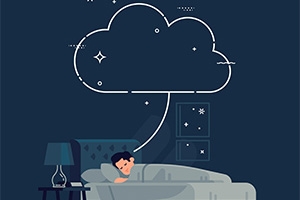How to Wake Up Bright and Breezy
6 tips to get up with zest
 "Would you like to be unnaturally bouncy in the morning?" courtesy of nickestamp
"Would you like to be unnaturally bouncy in the morning?" courtesy of nickestamp"Early morning cheerfulness can be extremely obnoxious." ~ William Feather
Wake up! Come on, get out of bed!
Have you ever noticed that the average amount of sleep people seem to need is always 'five more minutes'? The dreaded alarm goes off or your partner yells at you to WAKE UP! And it's "just give me five more minutes" - as if 300 more measly seconds will replenish the awakener all they need for the day ahead.
Of course five more minutes doesn't make up for a poor night's sleep, but it does make us feel that we, at least, have time to prepare ourselves for the great launch into the vertical and coherent world of waking life.
To be fair, some people do seem to be naturally 'slow wakers', the type who can't make major decisions (apart from whether to have coffee) for at least 60 minutes after rising. There may be some genetic marker for chirpiness in the mornings and drowsiness in the evenings and vice versa, but I suspect so much of the 'lark and owl' stereotyping comes down to lifestyle habit and behaviour rather than genetic destiny.
Chronic inability to wake up and get on with the day can be due to all kinds of things, and it's important to understand what may have been stopping you waking up feeling the joy of spring (even in winter). So what makes us feel so reluctant to leave the sheets come sunrise?
How to wake up to what's been causing morning drowsiness
Here are some ideas as to what may have been causing morning lethargy. And some tips to help you wake up with more zest.
Too little sleep. Yes, you heard it here first. Actually, it's obvious, isn't it?
Most teenagers need up to ten hours of sleep a night (1) - a few hours more than the average adult. So trying to prise your adolescent from under the quilt after only 7 or 8 hours' shuteye may be like trying to drag a thirsty horse away from its trough before it's properly quenched.
Okay, so maybe you're no teenager (although you might have been once), but we all need sleep - not only the right amount, but also the right quality. Different people, it seems, do need differing amounts of sleep; so if you're struggling to get up in the mornings, it could just be that you've had insufficient time for sleep.
1) At the risk of stating the obvious: get more sleep. Be disciplined about having a wind-down period before bed - which should be at a reasonable time to give you a shot at catching enough sleep time. This wind-down time also means no TV or computer usage for at least an hour before bed, as consuming either of these 'digital stimulants' will make it harder to get to sleep.
Too little of the right kind of sleep. It's long been known that depressed people tend to wake up tired. In fact, the more they sleep, the less they feel like waking up and getting motivated. How can this be? Surely if you are sleeping enough hours, then you will eventually feel refreshed?
But not all sleep is the same. When we're happy, or reasonably so, we'll have around 75% deep recuperative, restful, and re-energizing sleep to 25% of the much less restful REM or 'dream sleep' (2).
I'm not suggesting you're depressed if you don't wake up every morning with the energy of a hyperactive six-year-old on the morning of their birthday (I certainly don't). But if you seem to be sleeping for a sufficient time yet are still waking up exhausted, it could be that you are worrying more than usual at the moment and that worry is upping the proportion of REM sleep at the expense of the slow wave 'deep sleep' we all need.
2) If you feel that your sleep is 'restless' and you wake up (even after a good quantity of sleep) feeling tired, agitated, or flat, then look at addressing your daytime concerns and worries, which may be making it harder to 'switch off' even when you're asleep. Take a look at my 'Relieve Tension in Your Mind and Body' article.
Sleeping pills. The old 'sleeper' may well get you off to sleep, but like daytime stress and tension will deny you the right kind of deep sleep you need, meaning you wake up feeling un-refreshed and tired.
3) If you feel you have to use sleeping pills, be aware of how drowsy a hangover they can give you and limit your usage - in both amount and length of time you take them. Nothing can replace natural sleep. If you feel you're addicted to sleeping pills, as many people are, then take steps to wean yourself off with the help of your doctor. No sleep may be better than some sleep if that sleep is poor quality.
Alcohol. The same applies with the wee bedtime dram. Feeling 'drugged' in the morning may happen because you literally are. A nightcap, just like a sleeping pill (and these of course should never be taken in combination), may help you go to sleep in the sense that you lose consciousness, but sleep needs to be untroubled by booze in order to work at its best. Alcohol disrupts sleep quality, if not quantity.
4) Don't drink every night or even, dare I say, most nights; and if you do, make sure you stop three or four hours before bedtime. If you feel your drinking has got out of control, then understand that whilst you're still drinking you can't expect to feel bright-eyed in the morning and that even one or two drinks may slow you down the next day.
Blood sugar levels and energy. If you drink cola by the swimming-pool-load and consume sugar by the mountain or even if you overdo the sucrose intake just a bit, this constant spiking of your blood with the sweet stuff, as well as making it more likely you will get sick and fat, will play havoc with your energy levels (3).
5) To wake up feeling a sense of more natural pep and energy, look to your diet. Is it full of hidden and not-so-disguised sugar (including fructose and glucose, the two components of table sugar)? Are you raising your blood insulin levels with too much unrefined carbohydrate? (This too will play havoc with your energy levels.) If so, really start to focus on making your diet less prone to spiking your body's sugar levels and more about keeping those levels even for sustainable energy.
But believe it or not, waking up with more enthusiasm isn't all physical.
Waking up with the right attitude. If we expect to wake up reluctantly with all the energy of a dead trout, then that very expectation can prove self-fulfilling. Likewise, if we totally equate extra time under the covers as 'a treat', then this attitude may make it harder to break free of the comfortable chains of your bed.
6) Get into the habit of visualizing yourself leaping out of bed. In your mind's eye, watch yourself waking up and getting up with energy and zeal. You can do this visualization exercise the night before as you are drifting off.
Getting into the habit of starting the day as you mean to go on, with a sense of increasing energy and enthusiasm, can ultimately make all of your life more fun and productive.

Get a free hypnosis session with our Sleep Well app for iPhone & Android
Includes our most popular sleep session free, with the option to upgrade to 12 more sessions.
Get the Sleep Well app for iOS (iPhone or iPad) here or for Android here.
References
- A 1997 study of 3,120 Rhode Island teenagers, conducted by Carskadon and Amy Wolfson, assistant professor of psychology at The College of the Holy Cross in Worcester, Massachusetts, found that 85 percent were chronically sleep-deprived and accumulated a minimum 10-hour sleep deficit during the week. Forty percent went to bed after 11 p.m.; 26 percent said they usually got less than 6.5 hours of sleep on school nights.
- See New Scientist's interview with Joe Griffin.
- See Sugar: The bitter truth, a YouTube lecture by Robert H. Lustig, MD.








